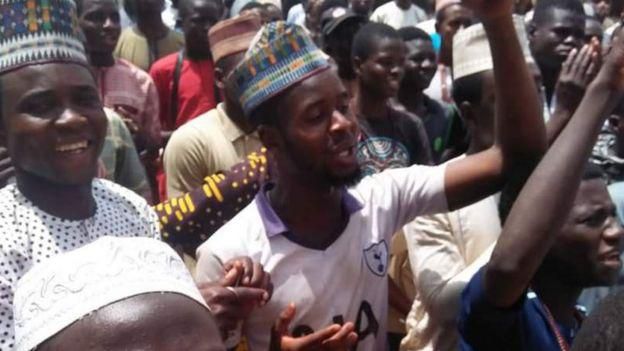This musician is about to be hanged to death in Kano for blasphemy
)
Yahaya Sharif-Aminu, a musician in Nigeria's northwestern state of Kano, has been sentenced to death by hanging for blaspheming against the Prophet Muhammad.
The BBC reports that an upper Sharia court in the Hausawa Filin Hockey area of the state, found 22-year-old Sharif-Aminu guilty of blasphemy in a song that made the rounds on WhatsApp in March.
Sharif-Aminu did not deny the charges.
However, Judge Khadi Aliyu Muhammad Kani said Sharif-Aminu has 30 days to appeal the verdict.
States in Nigeria’s predominantly Muslim northern region live by secular and Sharia law.
Only one of the death sentences passed by Nigeria's Sharia courts has been carried out since they were reintroduced in 1999.
In 2002, a man accused of killing a woman and her two children, was hanged to death.
'A deterrence'
The singer is currently in detention and had gone into hiding after he composed the song.
Protesters burnt down his family home and gathered outside the headquarters of the Islamic police, known as the Hisbah, to call for his head.
Critics said the song was blasphemous because it praised an imam from the Tijaniya Muslim brotherhood and elevated him above the Prophet Muhammad.
One leader of the protesters who called for the musician's arrest in March, Idris Ibrahim, told the BBC that the judgement will serve as a warning to others “contemplating toeing Yahaya's path.
"When I heard about the judgment I was so happy because it showed our protest wasn't in vain.

"This will serve as a deterrent to others who feel they could insult our religion or prophet and go scot-free," he said.
"It was the kind of judgment we hoped for when we arrested him," said Lawan Muhammad of Hisbah.
Sharif-Aminu is an Islamic gospel musician. He is not very known in northern Nigeria and his songs were not popular outside his Tjjaniya sect.
About Sharia law in Nigeria
The last time a Nigerian Sharia court passed a death sentence was in 2016 when Abdulazeez Inyass was sentenced to death for blaspheming against Islam.
He was alleged to have said that Sheikh Ibrahim Niasse, the Senegalese founder of the Tijaniya sect, which has a large following across West Africa, "was bigger than Prophet Muhammad".
The sentence has not been carried out as a death penalty in Nigeria requires the sign-off of the state governor.
12 states in northern Nigeria operate the Sharia system of justice, but only Muslims can be tried in its courts.
The Sharia system, which also has its own Court of Appeal, handles both civil and criminal matters involving Muslims.
Sharia judgments can also be challenged in Nigeria's secular Courts of Appeal and the Supreme Court.
The Sharia judges, known as Alkalis, are learned in both Islamic and secular laws.
Sentences handed down by the Sharia courts include floggings, amputations and the death penalty.
Many people convicted of theft under Sharia law have had their limbs amputated.

)
)
)
)
)
)
)
)
)
)
)
)
)
)
)
)